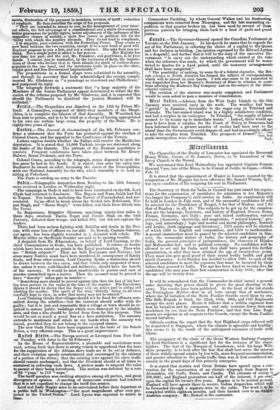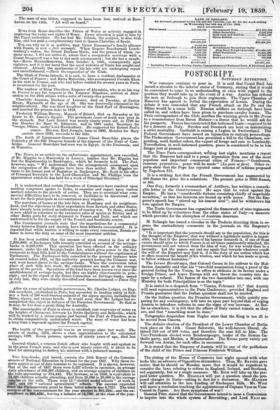3litottliautous.
The Chancellor of the Duchy of Lancaster has appointed the Reverend Henry White, Curate of St. James's, Dover, to be Incumbent of the Savoy Church in the Strand.
We understand that Lord Malmesbury has appointed Captain Francis Howard Vyse, late of the Blues, to be Consul at Jeddo, in Japan.—Globs, Feb. 17.
It is stated that the appointment of Master in Lunacy vacated by the resignation of Mr. Higgins has been offered to Mr. Samuel Warren, Q.C., but upon condition of his resigning his seat in Parliament.
The Secretary of State for India in Council has just issued his regula- tions for the examination of candidates for admission to her Majesty's (no longer the Company's) civil service in India. An examination will be held in London in July next, and of the successful candidates 26 will be selected for the Presidency of Bengal, 8 for that of Madras, and 7 for that of Bombay; in all, 41. The subjects to be got up for the examina- tion are the language, literature, and history of England, Greece, Rome, Frauce, Germany, and Italy ; pure and mixed mathematics, natural science, (chemistry, electricity, and magnetism, " natural history," geo- logy, and mineralogy,) logic and mental and moral philosophy, Sanacrit and Arabic, (both language and literature) ; 7375 marks will be allotted, of which 1600 to English and composition, and 1250 to mathematics. A second examination must be passed by the selected candidates in San- writ, the vernacular dialect of India, the history and geography of India, the general principles of jurisprudence, the elements of Hindoo and Mahomedan law, and in political economy. No candidates will be allowed to set sail for India until they shall have passed this further examination, or after they have attained the age of twenty-four years. They must also give good proof of their sound bodily health and good moral character. Lord Stanley has decided to allow 1001. to each of the selected candidates to meet the expenses that must be incurred by them before they proceed to India. The age has been fixed at twenty-five for candidates who may pass their first examination in July 1859 ; after that the age will be twenty-four.
It will be remembered that the Commander-in-chief issued a general order directing that prizes should be given for good shooting in the army. The results have been published. At the head of the list stands the Nottingham Militia—first in all tests except that of marksmen, where the 2d battalion of the Scots Fusilier Guards excel them by one. The Rifle Brigade is third, the 22nd, 55th, 36th, and 11th Regiments occupy the next places. Hence it follows that a militia regiment fires best by battalion and by companies, and only contains fewer first-rate marksmen by one, than the Scots Fusiliers • and that four Lino Regi- ments arc superior in all respects to the Guards, except the Scots Fusilier second battalion.
Officials confirm the report that the first Highland corps relieved will be despatched to Singapore, where the climate is agreeable and healthy; this seems to be the result of the anticipated extension of trade with China.
The occupancy of the chair of the Great Western Railway Company by Lord Shelburne is a significant fact for the fortunes of the share- holders. The heir of the Marquis of Lansdowne' with his large Wilt- shire property, is to look after the line that shallbest serve the interest of those widely-spread estates by low tolls, more frequent accommodation, and greater attention to the goods traffic than was at first considered ne- cessary in the grand days of this princely enterprise.
It is stated that Austria and Great Britain have agreed upon a con- vention for the construction of an electric telegraph from Ragusa to Alexandria, via Corfu, Zante, and Candia. The estimate of outlay it., 500,0001., and England guarantees one half of the interest, 6 per cent, upon the capital for twenty-five years. Ragusa is to be neutral ground. England will have agents there to receive Indian despatches, which will be forwarded through a separate wire in the cable. The work is to be completed within eighteen months, and then handed over to an AryEjarr Austrian company. Mr. Newell is the contractor. The man of war Orion, supposed to have been lost, arrived at Bere- haven on the 14th. " All well on board."
News from Rome describes the Prince of Wales as actively engaged in exploring the ruins and sights of Rome. Every attention is paid to him by the Papal authorities. He has had Mr. Gibson, the sculptor, to dine with him, and has paid a complimentary visit to Queen Christina of Spain.
You can rely on it as positive, that Victor Emmanuel's family alliance with Russia is now a fait accompli. When Eugene Beauharnais Leach- tenberg's widow, the Grand Duchess Maria, was the person of whom ru- mour spoke, I did not notice it, aware that a morganatic marriage with a Count Strogonoff was a bar to any such arrangement ; but she has a daugh- ter—Marra Maximilianowna, born October 4, 1841, consequently aged eighteen, and it is her hand that the royal widower of Turin has sought and obtained. Already the apartments of his late wife are undergoing repair and embellishment.—Paris Correspondent of the Globe.
The Shah of Persia intends, it is said, to have a resident Ambassador at the Court of France ; and Mirza Malcoulm, who accompanied Ferukh Khan in his visit to France, and who had before resided for several years in Paris, is mentioned for the poet.
The nephew of King Theodore, Emperor of Abyssinia, who is on his way to France to pay his respects to the Emperor Napoleon,-arrived at Alex- andria on the 24th ultimo with a suite of twenty-five persons.
Charlotte Augusta, Duchess of Leinster, died on Tuesday, at Carton House, Maynooth at the age of 66. She was deservedly esteemed in the neighbourhood. She was third daughter of the third Earl of Harrington, and married the present duke in 1818.
Frederick William Hervey, Marquis of Bristol, died on Saturday at his house in St. James's Square. The proximate cause of death was gout in the stomach. But Lord Bristol was nearly ninety years old, in 1796 he i was Member for Bury St. Edmonds, and in 1801 under Secretary for ''oreign Affair' s, under Lord Hawkesbury. He supported Sir Robert Peel's . course. His son, Earl Jermyn,'born in 1800, Member for Bury ...monde since 1830, succeeds to the title.
The death of Lieutenant-General James Claud Bourchier places the Colonelcy of the 83d Dragoon Guards at the disposal of the Duke of Cam- bridge. General Bourchier had seen war in Egypt, in the Peninsula, and at Waterloo.
The Times, in an article on the unfortunate appointment, now cancelled, of Mr. Higgins to a Mastership in Lunacy, implies that Mr. Higgins has lost the Registrarship in Bankruptcy, which he formerly held. The Post, however, says, " We understand that the arrangements consequent upon the resignation of Mr. Higgins have been thus settled. Mr. Higgins re- turns to his former post of Registrar in Bankruptcy, Mr. Scott to his office of Principal Secretary to the Lord Chancellor, and Mr. Phillips loses the appointment which he has held for a week of irincipal Secretary."
It is understood that certain Chambers of Commerce have resolved upon sending competent agents to India, to examine and report upon various matters relative to the growth of cotton. They are to ascertain what com- mercial difficulties have to be removed, or facilities to be discovered ; and to act for their principals as circumstances may require.
The purchase of horses at the late fairs at Hamburg and its neighbour- hood, and the objections to their exportation from Bavaria and other States, have already been noticed as indications of coming war. To these, another is now added in reference to the extensive sales of spirits at Stettin and at other Baltic ports for early shipment to France and Italy, and which are understood to be for the supply of the French and Sardinian armies.
The Continental journals state that the negotiations for a commercial treaty between Russia and Austria have been hitherto unsuccessful. It is reported that while Austria is willing to make every concession, Ruesia.re- fuses to lower the duty on some of the most important articles.
It has been notified that the amount of stock created in lieu of the 7,600,0001. of Exchequer bills recently cancelled on account of the savings- banks is 8,469,2391. This operation has been effected in the ordinary manner, under the old Savings-banks Act, which gives power to the Go- vernment to fund bills held by the Commissioners without the cognizance of Parliament. The Exchequer-bills cancelled in the present instance were all created before 1851, on the authority granted during the Crimean war, and were issued direct to the savings-banks. When the conversion takes place of such bills into stock, the calculations are made at the average prices of the period. Operations of the kind have been known ever since the establishment of savings-banks, but they are highly objectionable in prin- ciple ; and in the report of the Select Committee on Savings-banks, issued in July last, they were clearly described and discountenanced.—Times City Article.
After six years of indomitable perseverance, Mr. Charles Ledger, an Eng- lish merchant, established in Peru, has succeeded in landing safely at Syd- ney a flock of 280 wool-bearing animals of the alpaca species, including the llama, alpaca, and vicuna breeds. It would seem that Mr. Ledger has ac- complished this object in defiance of the Peruvian Government. Be that as it may, he has done a great thing for Australia.
The municipality of Paris is about to establish vast reservoirs of water on the heights of Chaumont, between La Petite Quillette and Belleville, which will be worked by a steam-engine just beyond the Pont de Flandres, so as to obtain comparatively undisturbed water. The want of water has been a long time a reproach against the French capital.
The health of the metropolis was in an average state last week. The return of deaths, 1274, shows a close approximation to the calculated average, 1298. Seven persons, upwards of ninety years of age, died last week.
General Ginkel, a veteran Dutch officer who fought with and against us in the great French wars, and who is now ninety years old, is about to be tried for attempting to destroy his mistress with a poisoned sausage.
Two blue-books,just issued, contain the 24th Report of the Commis- sioners of National Education in Ireland for the year 1857. Why these re- ports appear so out of date remains to be explained. It is shown, however, that at the end of 1857 there were 5,337 schools in operation, an average daily attendance of 268,397 children, and an average number of children on the rolls amounting to 514,445. The increase, as on 1856, is equivalent to 14,386 children actually attending, and from 26,000 to 28,000 is the average number on the rolls. There were 13 "district model schools" at work in 1857, and 166 " national agricultural" schools. The amount expended from the Parliamentary grant in these latter schools was 6,7211. The total receiptia of the commissioners for the year amount to 302,2241., and the ex- penditure ea 289,4261., leaving a balance of 12,7991. at the close of the year.



























 Previous page
Previous page